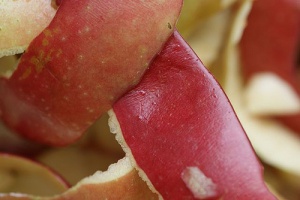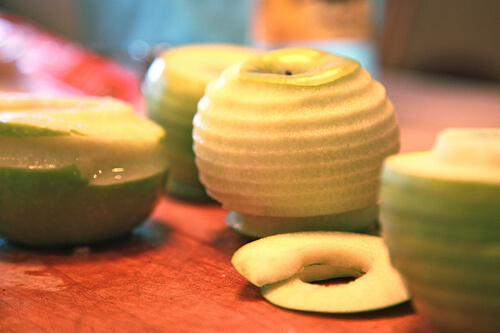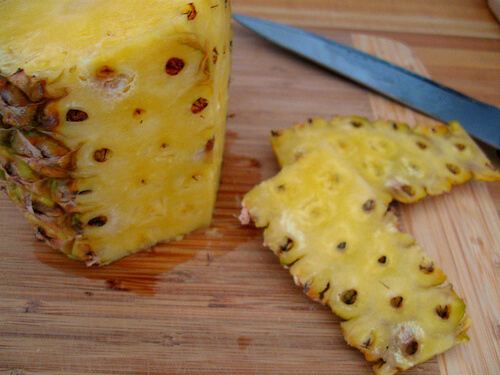Should You Eat Fruit Peels?

There’s a lot of confusion about whether or not some fruit peels are good to eat.
In this article, we’ll explain when it is- and isn’t – healthy to eat fruit peels. Learn how to take full advantage of all of the nutritional benefits these fruits can offer!
The Nutrients in Fruit Peels
In the past, people ate entire fruits.
Actually, we can even use fruit peels that we usually throw out, such as lemon or orange peels, as natural remedies for certain illnesses.
Fruit peels are the part of the fruit that receives the most energy due to their exposure to sunlight. They protect the inner fruit from harsh weather, and therefore have the most fiber and color (and, as a result, nutrients).
Read more: 5 Delicious Vegan Smoothies that are Rich in Vegetable Protein and Fiber

When Shouldn’t We Eat Them?
The biggest problem with fruits and vegetables today is that farmers add a large amount of pesticides to increase and protect the crop. Unfortunately, this makes fruit today different from what we used to eat.
Even after washing the fruit, these pesticides penetrate the fruit through the pores of the peel. Some fruits are more porous than others, so some now recommend that you always peel your fruit.
For those who would also like to take advantages of the nutrients found in peels, we recommend that you always choose fruit that is ecologically or organically certified or from your own crop. In addition, you should also wash it well with water and baking soda and a special tool to clean vegetables.
What Are the Healthiest Fruit Peels?
As long as these fruits are organic, we always recommend to eat the following with peels:
- Apples: The peel of apples contains ursolic acid. This helps keep muscles healthy, has anti-inflammatory properties, prevents high cholesterol, and promotes collagen production. Meanwhile, it supplies pectin and fiber to fight constipation
- Pears: To take advantage of all of the antioxidant properties, you should eat the entire peel This is because the majority of the peel contains vitamin C. Also, it contains soluble fiber, which makes it a more filling food that prevents constipation and illnesses like colon cancer.
- Citrus fruit: The peel is the part that contains most antioxidants in citrus fruits. This is due to its flavonoids, which have many benefits. It also contains the bulk of the vitamin C and has diuretic, relaxing, and digestive benefits.
- Grape: Flavonoids, anthocyanin pigments, and resveratrol are all mainly in the skin and seeds of the grape. These protect blood capillaries and promote cardiovascular health in general. Plus, they contain a large amount of antioxidants.
- Bananas: The skin or peel of a banana has antibiotic, anti-fungal, and enzymatic properties. You can eat it raw or cooked, after washing it. Plus, the inner part of the peel can even whiten your teeth by rubbing it on them after brushing them.
- Pineapple: You can prepare a healthy and therapeutic tea or a delicious fermented drink with the skin of a pineapple. Both drinks help avoid liquid retention and improve digestion.

Don’t miss this article about pineapple: Delicious and Medicinal Drinks with Pineapple Peel
A Note About Allergies
There are people who have allergies to the peels of certain fruits.
However, its possible that, in reality, a chemical substance on the plant or tree to prevent insects is causing the reaction. This is why it’s recommended to always consume organic fruit, especially if you’re going to eat the peel.
All cited sources were thoroughly reviewed by our team to ensure their quality, reliability, currency, and validity. The bibliography of this article was considered reliable and of academic or scientific accuracy.
- Díaz Varela, J & López Lago, I & Merino, Fuencisla. (1996). La bromelina: una proteasa de interés comercial. Ciencia y Tecnología Alimentaria. 10.1080/11358129609487552.
- Martín, A.R., Villegas, I., La Casa, C., y de la Lastra, C.A. (2004). Resveratrol, a polyphenol found in grapes, suppresses oxidative damage and stimulates apoptosis during early colonic inflammation in rats.
Biochemical Pharmacology, 67, 1399-1410. - Liu J, Yu H, Ning X (2006) Effect of quercetin on chronic enhancement of spatial learning and memory of mice. Sci China
C Life Sci 49:583-590. - Palomo G, Iván, Yuri S, José Antonio, Moore-Carrasco, Rodrigo, Quilodrán P, Álvaro, & Neira E, Amalia. (2010). EL CONSUMO DE MANZANAS CONTRIBUYE A PREVENIR EL DESARROLLO DE ENFERMEDADES CARDIOVASCULARES Y CÁNCER: ANTECEDENTES EPIDEMIOLÓGICOS Y MECANISMOS DE ACCIÓN. Revista chilena de nutrición, 37(3), 377-385.
This text is provided for informational purposes only and does not replace consultation with a professional. If in doubt, consult your specialist.








